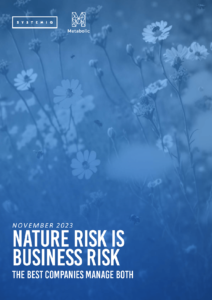The crisis in our natural ecosystems poses direct, near-term risks to the majority of businesses.
Christine Delivanis and Liesbeth Huisman-Brouwer argue that businesses must find ways to financialise the likely nature risks, and to monetise the commercial opportunities that a transition to more nature-positive business models will inevitably create.
The health of our planet is in crisis – global warming, extreme weather events, land degradation, worsening air quality, ocean plastics and the steep decline in species diversity are increasingly widespread and visible. Communities and individuals around the world are affected: the decimation of the Dadia forest in northern Greece in Summer 2023 dealt a severe blow to local agriculture, even as residents of New York struggled their way to work through smog from Canadian wildfires.
With half of our world economy classed as being moderately or highly dependent on nature, large businesses are also more directly impacted. This creates nature risk for business – and it creates opportunities. However, most businesses are not yet taking action commensurate to the risks they face.
A new white paper, created with support from Metabolic, argues that, for businesses to act, we need to help them financialise the risk and monetise the opportunities. Even though the topic of nature is complex – it is multi-dimensional, it is location-specific, it is often hidden in supply chains – we believe progressive leaders should start to investigate this topic, to build future resilience and to stay ahead of investors, regulators, and the competition.
Guided by emerging frameworks – most notably the TNFD, SBTN and CSRD – we show how companies can, step by step, understand key nature related impacts and dependencies, debate the strategic and financial merits and drawbacks of different types of action, and decide on the path forward. The approach we propose uses these frameworks as a starting point, but also enables businesses to connect the ‘nature’ topic with conversations on core strategy, risk management and financial performance. Our experience suggests this is often the only way to ensure the topic gets the attention it deserves.
"No other global system is so deeply rooted in nature as our food and land use system. Awareness is growing that businesses need to better understand the physical and transition risks this involves. Global companies have an opportunity to approach this strategically, financialize risks and unlock the business opportunities in going truly nature positive."

Morgan Gillespy
Executive Director,
Food and Land Use Coalition (FOLU)


